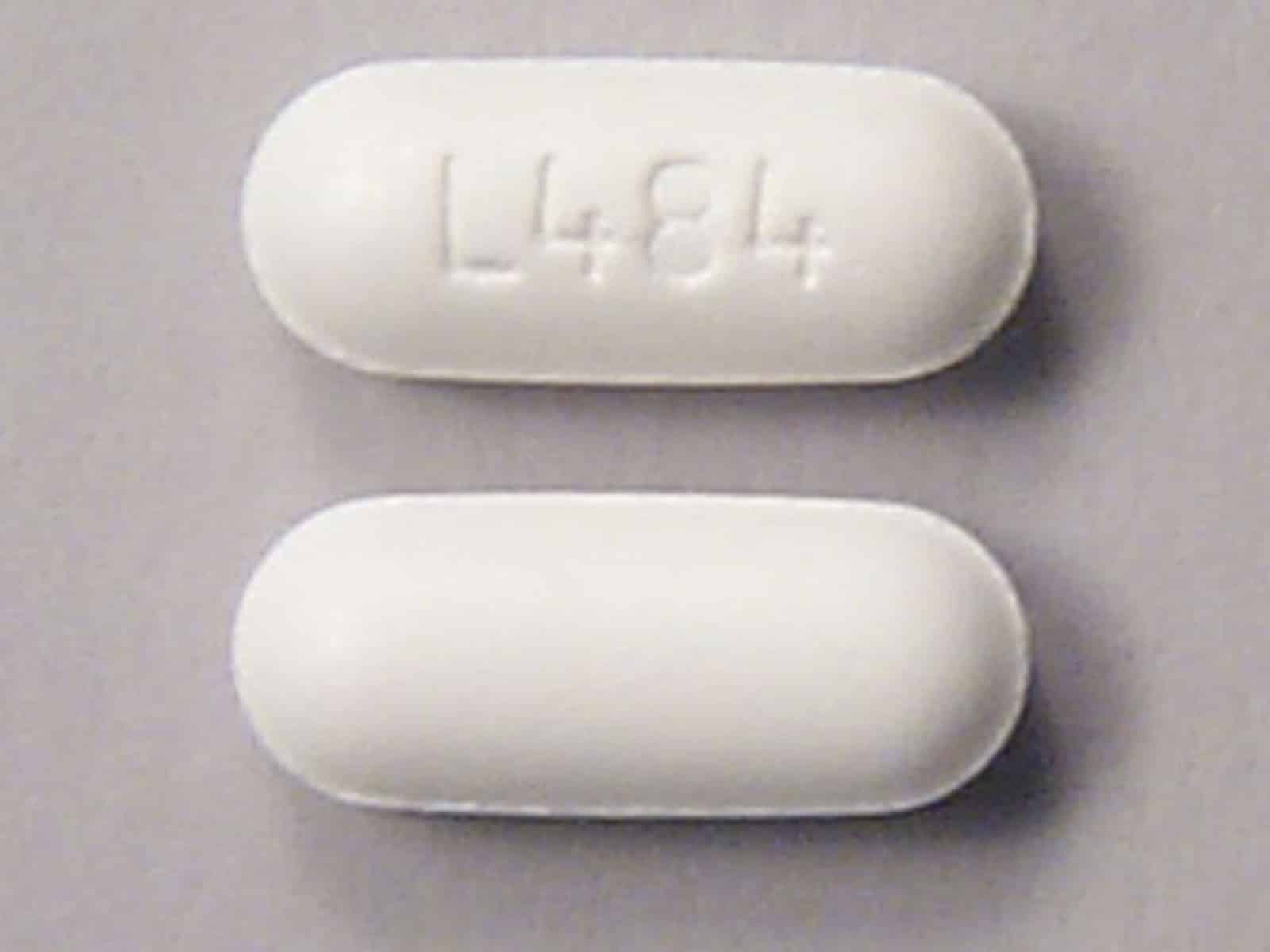TL;DR – The white pill with “l484” imprint is an over-the-counter pain reliever containing 500 mg of acetaminophen, commonly known as generic Tylenol. Always consult with a healthcare professional before taking any medication.
From minor pains to fevers, headaches and more, over-the-counter pain relievers generally provide an effective way to minimize discomfort. The L484 pill is an analgesic that is commonly used. Because it is available at local drug stores, grocery stores and even gas stations, this pill may be a first-line solution for pain relief.
Physical Characteristics
The L484 pill has an oblong or oval shape. It is characterized by its white coloring and an imprint of L484. This is a unique number and letter combination that allows pharmacists to quickly and correctly identify the medication. While this medication is available in both generic and brand-name formats, it may also be one of several ingredients in other medications. For example, it is often found in multi-symptom cold and flu medications.

Active Ingredient
Each L484 pill contains 500 milligrams of acetaminophen. This widely used medication inhibits specific brain chemicals that control body temperature and relay pain signals. As a result, it is an effective solution for fever reduction and pain relief for mild to moderate discomfort. Often, it is used as a fever reducer for colds and flu. It is also commonly used to manage pain from earaches, muscle aches, toothaches and headaches. The L484 pill may also contain several inactive ingredients, such as corn starch, polyethylene glycol, carnauba wax and a few others.
Dosage and Administration
The recommendations for safe use of the L484 pill vary by the individual’s age and weight. The specific instructions are found on the medication’s packaging. Typically, the dose for adults and children over the age of 12 is two tablets taken every six hours. You should not consume more than four doses daily. While children may safely take this medication as well, you should consult with the child’s pediatrician or package label for specific dosage and usage instructions.
You will also find several warnings. For example, you should avoid consuming alcohol while taking acetaminophen. Because of how this medication is processed in the body, there is an increased risk of damaging your liver when the medication is taken with alcohol. If you have been diagnosed with liver disease, do not take this medication without first consulting with your doctor.
Acetaminophen is not contraindicated for pregnancy. Before taking this medication while pregnant, consult with your doctor. Regardless of your current health status, it is important to follow the dosage and usage instructions. Serious side effects and even death are possible if these instructions are not followed.
Uses of the L484 Pill
Because of the effect of L484 on the temperature management and pain receptors in the brain, this medication is used to reduce fever and relieve pain. Most commonly, it is used for body aches, headaches and fevers related to the common cold or seasonal flu. It may also be effective for menstrual cramps, oral pain, ear pain and arthritic pain. If your symptoms are not relieved using the recommended dosage, do not take more. Contact your healthcare professional to inquire about other remedies. In addition, this medication should not be taken for more than 10 days for pain relief and more than three days as a fever reducer. Taking more than the recommended dose or taking the L484 pill for longer than these periods of time can increase the risk of liver damage. Because of this, L484 may not be the best medication for long-term pain management for a chronic condition.
The best time to take acetaminophen is as the pain is coming on and before it gets intense. If the fever or pain is accompanied by other symptoms, such as a congested cough, vomiting, a rash or other symptoms, contact your physician. In addition, if the symptoms do not improve while taking the recommended dose, consult with your provider.

Side Effects
Most people do not experience side effects when taking the L484 pill. However, when they occur, side effects are often mild and manageable. Nausea is the most common side effect. Vomiting, diarrhea, fatigue and constipation may also occur. In rare cases, sweating and a worsening headache may be experienced. If you experience signs of an allergic reaction, seek immediate medical attention. These signs include difficulty breathing, severe dizziness, itching, swelling and a rash.
Interactions with Other Drugs
While acetaminophen is a safe, over-the-counter pain reliever that is widely used, it can have negative interactions with some other drugs. Before consuming the L484 pill with other medications, carefully read the labels for contraindications and to learn about ingredients. Because many other medications contain acetaminophen, you could risk an unintentional overdose. This may lead to liver damage, an increased likelihood of minor or serious side effects and potentially death. Some side effects of an overdose are confusion, vomiting, nausea and constipation.
Acetaminophen should also not be used with alcohol. If you intend to drink alcohol, discuss this ahead of time with your doctor to understand the recommendations and risks based on your health status.
Some other drugs may increase the risk of experiencing side effects when taking acetaminophen. This is because they directly affect how the body breaks down acetaminophen. Some of these are Tegretol, Dilantin and phenobarbital.
Medications like Warfarin and other anticoagulants are commonly used to break down and prevent blood clots, and they can minimize the risk of a heart attack or stroke. When taken with acetaminophen, however, Warfarin’s effects are magnified. As a result, you may be more likely to experience bleeding and other side effects. Your physician may complete an international normalized ratio blood test to determine your risk.
In addition, acetaminophen is not safe to take with isoniazid, a tuberculosis medication. Isoniazid produces several enzymes in the body to target tuberculosis, and these enzymes impact the metabolism of acetaminophen. This impacts the toxicity of acetaminophen and the severity of potential side effects.
These are only some of the medications that may not be safe to take with acetaminophen. In addition, the L484 pill could impact the immune response of children’s vaccines.
Precautions and Considerations
Before taking acetaminophen, it is important to read the package’s label. Pay attention to the active ingredients, and compare these to the active ingredients in other medications that you are taking. Pay attention to the total amount of acetaminophen that you are taking across all medications, and avoid exceeding the recommended daily dosage. In addition, be aware of medication interactions. Consult with your pharmacist or healthcare provider to ensure that it is safe to take the L484 pill with your other medicines.
Acetaminophen and alcohol are both metabolized in the liver. As a result, significant liver damage may occur when they are taken together. Consuming acetaminophen can also be unhealthy and even dangerous to those who have existing liver damage.
While L484 during pregnancy is not contraindicated, be aware that all of the risks of doing so may not yet be known. Consult with your obstetrician about your pain relief options when pregnant.
Allergic reactions to acetaminophen are rare, but they can be serious. For example, you may experience swelling, itchiness and a rash around the mouth, nose and throat. Difficult breathing, dizziness and confusion are some of the other signs of an allergic reaction. If you notice any signs of an allergic reaction, seek immediate medical assistance.

Safe Storage and Disposal
This medication should be stored in a dry, cool place. This may include a medicine chest, a cabinet, a closet or other similar areas. It should be kept away from heat sources, such as a furnace or stove. If you do not consume the full bottle of L484 pills before the expiration date, you should safely dispose of the remaining medication. Many pharmacies have a medication disposal program. If you do not have a program available in your area, you should place the pills in a sealed and watertight container before throwing them in the trash.
Conclusion
While acetaminophen is a commonly used medication for fever reduction and pain management, it must be used properly. Drug interactions, overdoses, allergic reactions and other issues can occur, and these can have dire consequences. If you have any questions or concerns about this or other medications, consult with your healthcare professional. If you are struggling with an addiction to pain killers, reach out to Live Free Recovery Services to learn about treatment options.
References
https://www.goodrx.com/acetaminophen/interactions
https://www.drugs.com/imprints/l484-10944.html#:~:text=Pill%20with%20imprint%20L484%20is,the%20drug%20class%20miscellaneous%20analgesics.
https://www.webmd.com/drugs/2/drug-892/acetaminophen-extra-strength-oral/details
https://californiaprimerecovery.com/l484-pill/


